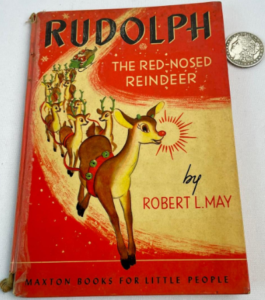 The most famous Reindeer of All
The most famous Reindeer of All
]Rudolph the Red-Nosed Reindeer is an iconic figure at Christmas time. He dates back to 1939 when Montgomery Ward introduced Rudolph to us by way of Robert May, a Jewish Chicago copyrighter assigned to write a short book to give away as a Christmas promo. Partially inspired by Hans Christian Andersen’s story, The Ugly Duckling, May wrote the original story in rhyme about a deer with a red nose who sometimes got teased and always wanted to help Santa. I must have had a copy of that original book as a child because the illustrations are familiar. What a pity that I don’t still have it!
An Act of Kindness
During the project, May lost his wife to cancer but he finished the story because he “needed Rudolph more than ever.” A co-worker illustrated it and they presented it to the boss. The boss hesitated to accept the story about a deer with a red nose; he worried people would think the deer was a drunkard, but they printed it anyway. Perhaps his humanity won him over. Or perhaps he identified with the misfit deer. The bosses never thought Rudolph had potential as more than a holiday promotion, but the story was so popular that they printed over 2 million copies that year.
Meanwhile, May, drowning in his late wife’s medical debt and struggling to raise his young daughter, went to Ward’s CEO for help. In an act of generosity so fitting to this story, Montgomery Ward signed over the rights for the book to May who released 1947 the book version of Rudolph. May’s brother-in-law, a songwriter named Johnny Marks, wrote the song most of us know so well. Gene Autry picked up and recorded Marks’ song. It sold more than 25 million copies.
The Big Screen
Rudolph appeared in an 8-minute film in 1948. A Detroit-based producer, Jam Handy Organization, copyrighted a cartoon version of Rudolph the Red-Nosed Reindeer shown in theaters as yet more advertising for Montgomery Ward. You can watch a re-release of the 1948 film, which includes the song, here
The Library of Congress has the only complete version of the original 1948 release. According to their website, they have a beautiful Technicolor nitrate print in the AFI/Columbia Pictures Collection. Sixteen years later, the famous stop-animation film spread Rudolph’s fame even wider.
The Misfit We Love
May always took pride in being the man who introduced his little reindeer, who didn’t quite fit in but saved the day, to the world. Let’s face it, most of us have identified with Rudolph, at one time or another, even if we never save the day. May Rudolph continue to go down in history.
Merry Christmas!
Sources:

Hi Donna,
Merry Christmas